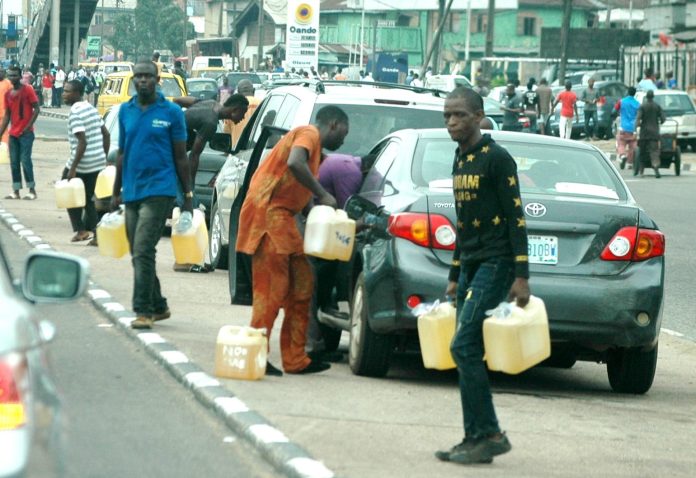As the fuel scarcity persists nationwide, numerous individuals have resorted to panic buying, stockpiling petrol in kegs and jerry cans within their homes and workplaces. Concurrently, black market vendors are distributing more fuel than the official filling stations.
Also, some Nigerians have thus expressed concern over the dangers posed by the careless handling of this highly inflammable product in many homes.
As reported, Mrs. Vivian Opara, a chemical engineer, said she was always scared of how Nigerians handle petroleum products. This could raze down a whole street in fewer minutes in the event of a fire, she warned.
While many have argued that fuel scarcity has provided a temporary means of livelihood for poor families through the black market, most people are worried about the looming dangers from the careless handling of the product by the retailers.
Investigations revealed that many compounds in Lagos such as Ajegunle, Orile, Amuwo Odofin, lyana-Ipaja, FESTAC, Yaba and Surulere have found the hawking of petrol quite lucrative.
The situation is similar to the way smuggled fuel from Nigeria is sold in the neighbouring countries, especially Benin Republic and Togo, where hawkers display the product on the road for willing buyers.
Mr. Kevin Eze, a car owner, spoke to Vanguard on Old Ojo Road. He said that he discovered that petrol is more available on Lagos streets than at the filling stations.
According to him, instead of queuing for a whole day at the filling station and missing all appointments, he would rather pay the black market high price for the fuel and meet up with his scheduled activities.
He said jokingly, “As you can see, every compound now has a ‘fuel dump’ while the long queues persist at the filling stations.”
Mr Ade Taiwo, a commercial bus driver in a chat with Vanguard along Apapa Road, Lagos, said that most of their members would rather buy from the black market than queuing up for endless hours at the filling stations.
“Unfortunately, we cannot make any profit by buying from the streets at twice the price at filling stations. This is because there are no passengers to pay for fare increases.
“They would rather trek several kilometres to their destinations than pay the higher fares.”
Meanwhile, the scarcity has literally forced many vehicles off the road, resulting in empty roads without usual traffic jams.
Most of the vehicles are either parked at home or they are in petrol queues.
Mr Muhammad Garba, while chatting with Vanguard at a filling station along Lagos Badagry expressway, said that the petrol attendants pay more attention to the black market sellers on the street.
Garba noted that this was so because of the tip they get for every purchase.
Pointing at a woman who came into the station with seven 50-litre jerry cans to buy petrol, Mr Garba asked, “Do you want to tell me that this woman will want the scarcity to end soon?”
Meanwhile, a filling station in FESTAC, Total Energies, has a policy that no customers should buy petrol in kegs, and the queue has been moving fast.
But some customers are not taking this very kindly as they kept asking how they should power their generators at home, especially during this period when the electricity supply has been very poor.
However, some private filling station owners have taken advantage of the scarcity to increase their pump price to about N850.
It was gathered that this approach is usually adopted when major dealers such as Mobil and Total have no products.


